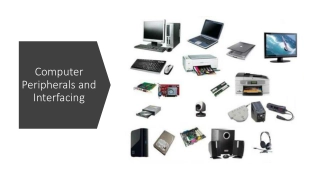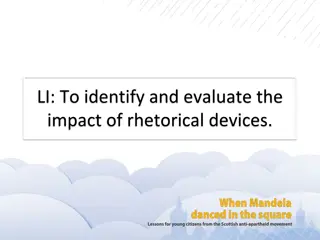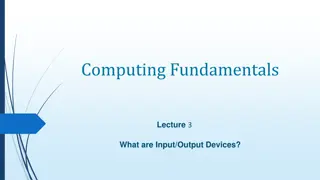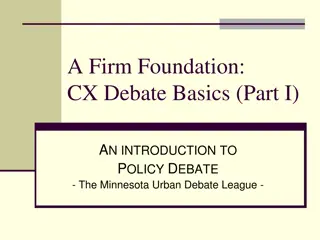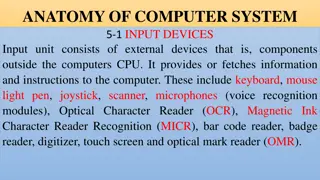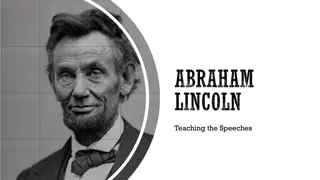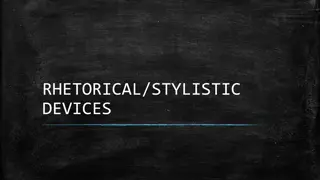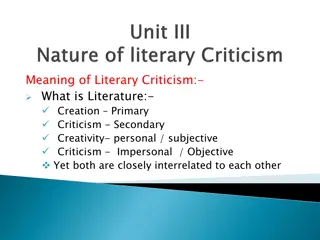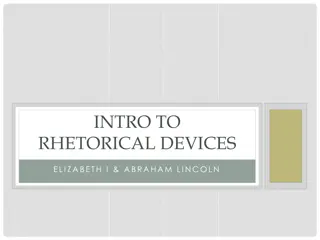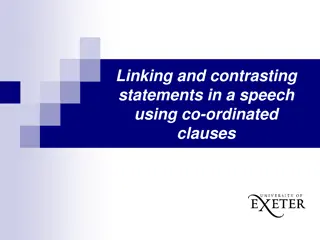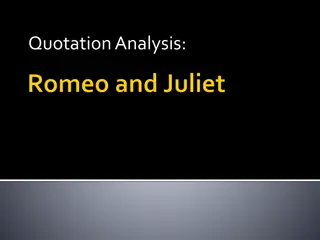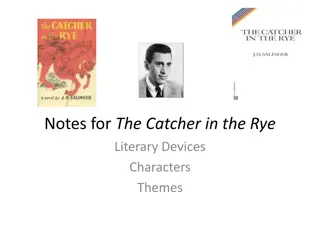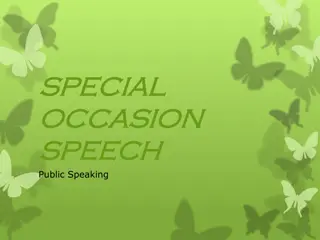Enhancing Speeches with Literary Devices for Effective Communication
Literary devices play a crucial role in speeches by adding emphasis, clarity, and relatability to the audience. Alliteration, assonance, connotation, denotation, and euphemism are powerful tools that can elevate the impact of your message. Understanding and using these devices skillfully can help you craft compelling and impactful speeches that resonate with your audience.
Download Presentation

Please find below an Image/Link to download the presentation.
The content on the website is provided AS IS for your information and personal use only. It may not be sold, licensed, or shared on other websites without obtaining consent from the author. Download presentation by click this link. If you encounter any issues during the download, it is possible that the publisher has removed the file from their server.
E N D
Presentation Transcript
Literary Devices and Debate Climb the Mountain Debate Summer 2022
What are Literary Devices? Literary devices are techniques used create effects to make the audience relate to the speech Adds emphasis and clarity Highlight the important parts of the speech
Alliteration The repetition of consonant sounds in a sentence or phrase Great for taglines! Examples: Calm, cool, collected Build Back Better
Assonance The repetition of two or more similar vowel sounds in words close to each other Examples Electric energy Stranger Danger Surf and Turf Words may not be perfect rhymes, but sill allows for emphasis Her green eyes beamed
Now You Do It! Topic: Electric cars should be required. Using alliteration or assonance for example taglines for either side of the topic. Clean Climate Pressuring People Crazy Costs
Connotation versus Denotation of Words Denotation- The actual dictionary definition of what a word means Connotation- The feelings, positive or negative that a word gives the listener Different words may leave your audience with certain feelings. Be aware in your speeches of the impressions your words may leave
Connotation and Denotation Examples Exposed, Reveled Courageous, confident, conceited Unique, different, peculiar
Now You Do It! Try to come up with an example where a word s connotation adds to the feeling of the sentence. The car was old. The car was decrepit.
Euphemism Disguising disagreeable or painful ideas with words that do not express the idea literally Examples: Pass away versus die Let go instead of fired Certified pre-owned over used car Softens the effect of the idea Use to lessen the impact of the less favorable effects of our case
Dysphemism The opposite of a euphemism Examples: Six feet under for death Deliberate harshen of a more agreeable term for effect Geek for smart Snail mail to describe sending letters via the post office Used to make your opponent s side sound like it has more negative impacts
Now You Do It! Use a euphemism or dysphemism to talk about impacts on the topic masks should still be required. Some number of people will pass away. The opponent s plan will put thousands of people six feet under.
Analogy Examples: A comparison of two dissimilar things to show that they are alike in some respects That movie was a roller-coaster of emotions Life is like a box of chocolates; you never know what you will get Often done to help explain an idea or make a point The universe is like a safe to which there is a combination, but the combination is locked up in the safe (Peter De Vries- Let Me Count the Ways Often done with similes and metaphors
Now You Do It! Use an analogy to explain Covid. The virus is like a house. It has the spike protein which is like a chimney. The envelope is like the walls of the house. The genetic information is like the plumbing in the house.
Simile and Metaphor Simile- Comparing two different things using like or as Metaphor- Comparing two different ideas or things without using like or as Both can be used to make comparisons that simplify an idea
Simile and Metaphor Examples Simile Metaphor It festers like a sore Time is a thief The sidewalk was as hot as the sun. His words cut deeper than a knife Love is like a battlefield He is a night owl Reading your kids fairytales is like giving them a guidebook to life with all the wrong lessons
Now You Do It! Use simile or metaphor to explain the topic electric cars should be required. Electric cars are like putting wallpaper on a crumbling house. Electricity still uses fossil fuels, so the result is a more expensive, prettier structure with all the same flaws as before.
Repetition Using a phrase or small part of the speech more than once Done to highlight that piece and add focus and emphasis Useful for taglines, which should be repeated many times throughout the debate
Now You Do It! Try coming up with a short speech that repeats the important parts. Topic: Football should be banned.
Imagery Language that appeals to our five senses (touch, taste, sight, smell, sound) Examples: Her lips tasted sweet as sugar Done to leave a more vivid picture in the audience s minds His head was pounding like a drum The siren faded to a whisper
Now You Do It! Think of a news topic and use imagery to describe it. On the Flint water crisis: The water from the tap looked like a mud puddle due to corroded pipes.
Diction Choosing the appropriate words for the occasion! Choose words strategically and with thought to the connotations of the words you use Euphemisms and imagery can leave the judge with the feelings you want them to feel Pay attention to formal versus informal language How should the judge be addressed compared to a close friend?
Now You Do It! Think about some ways that you should talk to a judge in a round. No: School starting later is a wild idea. Yes: It is unwise to start school later due to these reasons.


